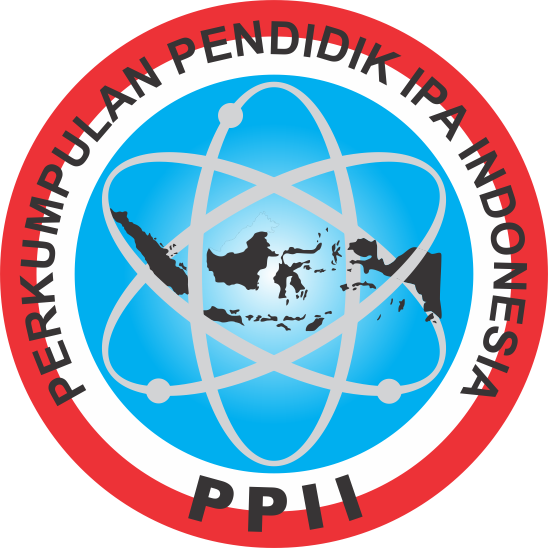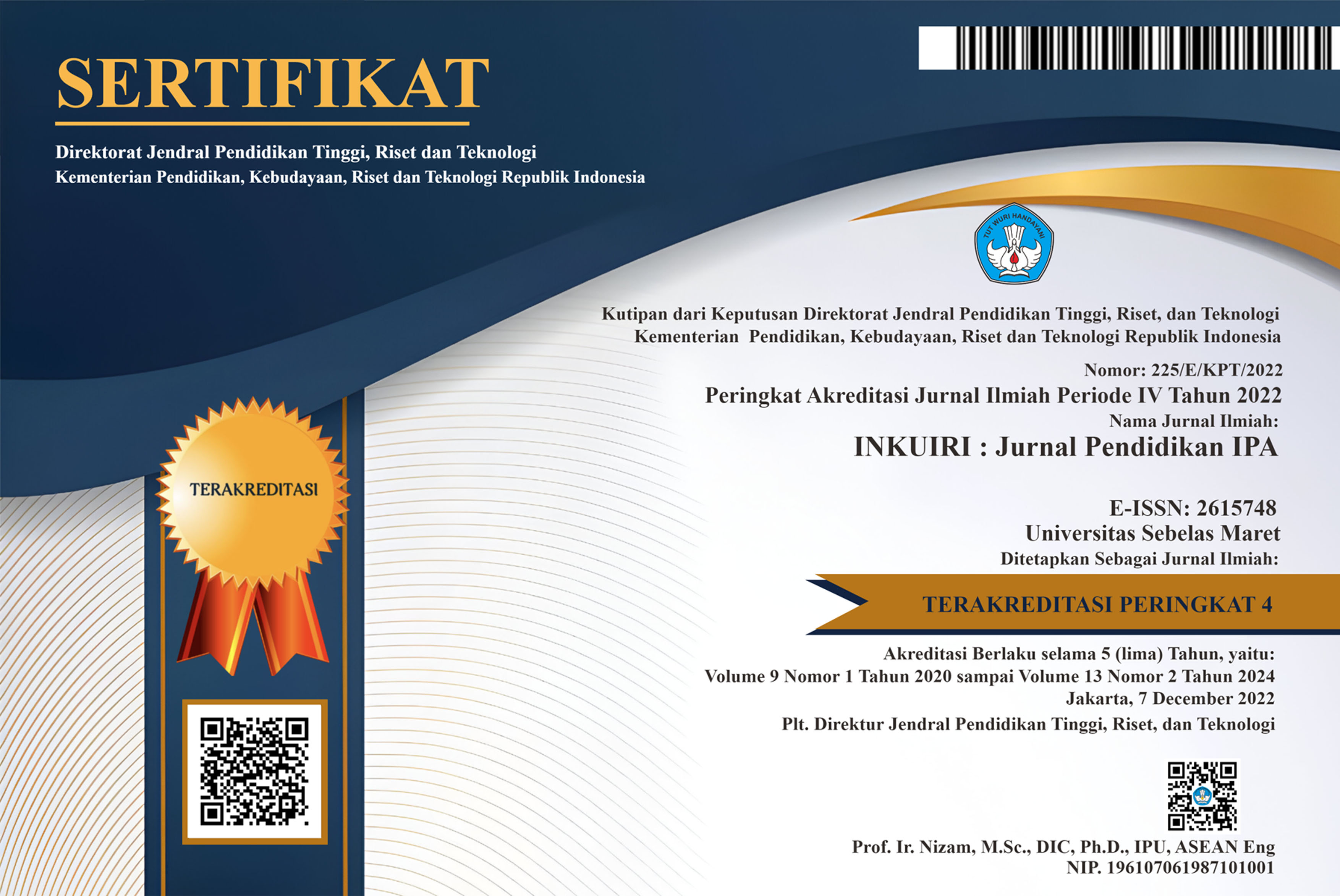ANALISIS KEMAMPUAN TPACK (TECHNOLGICAL, PEDAGOGICAL, AND CONTENT, KNOWLEDGE) GURU BIOLOGI SMA DALAM MENYUSUN PERANGKAT PEMBELAJARAN MATERI SISTEM PEREDARAN DARAH
Abstract
Perkembangan ilmu pengetahuan dan teknologi bisa dijadikan salah satu cara untuk meningkatkan kualitas pembelajaran yang dilakukan oleh seorang guru. Untuk bisa mewujudkan hal tersebut, seorang guru perlu memahami dan mimiliki kemampuan Technological Pedagogical Content Knowledge (TPACK) yang merupakan pengembangan dari Pedagogical Content Knowledge (PCK)-nya Shulman (1986). TPACK merupakan pengetahuan untuk mengintegrasikan teknologi ke dalam pengajaran materi tertentu. Penelitian ini bertujuan untuk mengetahui kemampuan guru biologi di SMA dalam aspek TPACK. Jenis penelitian ini adalah penelitian deskriptif kuantitatif dengan teknik cluster sampling . Sampel yang digunakan adalah 3 guru biologi di 3 sekolah (selanjutnya diberi kode B1, B2, dan B3) se – kecamatan gondang. Data dikumpulkan melalui metode observasi. Hasil penelitian menunjukkan bahwa pemahaman materi / Content knowledge (CK) guru B1 sebesar 76%, B2 sebesar 80% dan B3 sebesar 72% dalam kategori baik. Skor pada pengetahuan pedagogical knowledge (PK) guru B1 sebesar 50%, B2 sebesar 45%, dan B3 sebesar 60%. Skor pada pengetahuan technological knowledge (TK) guru B1sebesar 48,5%, B2 sebesar 40%, dan B3 sebesar 40%. Skor pada aspek Technological content knowledge (TCK) guru B1 sebesar 60%, guru B2 60% dan guru B3 40%. Skor pada aspek technological pedagogical knowledge (TPK) guru B1 60%, B2 67%, dan B3 60%. Skor aspek pedagogical conten knowledge (PCK) guru B1 60%, guru B2 40%, dan B3 54%. Skor pengetahuan TPACK guru B1 47%, guru B2 47%, dan B3 60%.
The development of science and technology can be used as a way to improve the quality of learning carried out by a teacher. To be able to make this happen, a teacher needs to understand and have the ability of Technological Pedagogical Content Knowledge (TPACK) which is the development of Shulman's Pedagogical Content Knowledge (PCK) (1986). TPACK is the knowledge to integrate technology into the teaching of certain materials. This study aims to determine the ability of biology teachers in high school in the TPACK aspect. This type of research is descriptive quantitative research with cluster sampling technique. The samples used were 3 biology teachers in 3 schools (hereinafter coded B1, B2, and B3) throughout Gondang sub-district. Data were collected through the observation method. The results showed that the understanding of the material / Content knowledge (CK) of B1 teachers was 76%, B2 was 80% and B3 was 72% in the good category. The score on the pedagogical knowledge (PK) of B1 teachers is 50%, B2 is 45%, and B3 is 60%. The score on the technological knowledge (TK) of B1 teachers is 48.5%, B2 is 40%, and B3 is 40%. Scores on the Technological content knowledge (TCK) aspect of B1 teachers are 60%, B2 teachers are 60% and B3 teachers are 40%. The scores on the technological pedagogical knowledge (TPK) aspects of teachers are B1 60%, B2 67%, and B3 60%. Scores of pedagogical content knowledge (PCK) aspects of B1 teachers are 60%, B2 teachers are 40%, and B3 are 54%. TPACK knowledge scores of B1 teachers 47%, B2 teachers 47%, and B3 60%.
Keywords
Full Text:
PDFReferences
Barber, M., & Mourshed, M. (2007). How the World’s Best Performing Schools Come Out on Top. New York : McKinsey & Company.
Chai, C. -S., Koh, J. H. -L., & Tsai, C. -C. (2013). A Review of Technological Pedagogical Content Knowledge. EducationalTechnology & Society, 16 (2), 31–51.
Chang, M., S. Shaeffer, S. Al-Samarrai, A. Ragatz, J. de Ree and R. Stevenson. (2014). Teacher Reform in Indonesia: The Role of Politics and Evidence in Policy Making. Directions in Development, No. 16355. Washington, DC: World Bank.
Direktorat Jenderal Peningkatan Mutu Pendidik dan Tenaga Kerja (PMPTK). (2008). Data Basis Guru. SIMPTK 2006 PMPTK (Direktorat Jenderal Peningkatan Mutu Pendidik dan Tenaga Kependidikan). 2008 Presentation on costs associated with the Teacher Law of 2005, Yogyakarta, Indonesia.
Harris, J. B., & Hofer, M. J (2011). Technological Pedagogical Content Knowledge (TPACK) in Action : A Descriptive Study of Secondary Teachers’ Curriculum Base, Technology – Related Instructional Planning. Journal of Research on Technologi in Education, 43 : 211- 229.
Hayati, D. K., Sutrisno, & Lukman, A. (2014). Pengembangan Kerangka Kerja TPACK pada Materi Koloid untuk Meningkatkan Aktivitas Pembelajaran dalam Mencapai HOTS Siswa. Edusains, 3: 53- 61.
Hewitt, J. (2008). Reviewing the handbook of technological pedagogical pedagogical content knowledge (TPACK) for educators. Canadian Journal of Science, Mathematics, and Technology Education, 8 (4), 355 – 360.
Hofer, Mark dan Judi Harris. (2012). “TPACK Research with Inservice Teachers: Where’s the TCK?. Proceedings of Society for Information Technology & Teacher Education International Conference”, (Online), (http://www.editlib.org/p/40 52., diakses pada 10 Januari 2019
http://ukg.kemdikbud.go.id. Diakses pada 25 januari 2019/17.40
Joope De Ree, dkk. (2012). Penelitian untuk Bank Dunia, “Transforming Indonesia’s Teaching Force.”http://www.worldbank.org/in/country/indonesia/brief/world-bank-and education-in-indonesia
Koehler, M. J., & Mishra, P. (2008). What Is Technological Pedagogical Content Knowledge? Contemporary Issues in Technology and Teacher Education. CITE Journal, 9(1), 60-70
Lestari, Suci. (2015). Analisis Kemampuan Technological Pedagogical Content Knowledge (TPACK) pada Guru Biologi SMA dalam Materi Sistem Saraf. Seminar Nasional XXI Pendidikan Biologi FKIP UNS. 557- 563.
Miarso, Y. (2004). Menyemai Benih Teknologi Pendidikan. Jakarta : Prenada Media dan Pustekom Diknas.
Mishra, P. dan M. J. Koehler. (2006). Technological Pedagogical Content Knowledge: A Framework for Teacher Knowledge. Teachers College Record. 6 (108): 1017-1058.
Mulyasa, E. (2005). Menjadi Guru Profesional Menciptaklan Pembelajaran Kreatif dan Menyenangkan. Bandung : Remaja Rosdakarya.
NCTM. (2000). Principles and Standards for School Mathematics. Reston, VA: The National Council of Teacher of Mathematics, Inc. Retrieved from. http://webapp1.dlib.indiana.edu/virtual_disk_library/index.cgi/4273355/FID3542/DOCS/ENC2280/28023310.HTM
Oyanagi, W. And Satake, Y. (2016). Capacity Building in Technological pedagogical Content Knowledge for Preservise Teacher. International Journal for Educational Media and Technology, 10 (1), 33 – 44.
Reiser, R and Gagne, R. M. 2008. The selection of Media for Instruction. Englewood Cliffs, Nj. Educational Technology Publications.
Ridla, M. (2008). Profesionalitas Guru Pendidikan Agama Islam dalam Proses Pembelajaran. Tadris, 3(1), 30–44.
Sagala, Syaiful. (2009). Konsep dan Makna Pembelajaran. Bandung : Alfabeta.
Sanjaya, Wina. (2013). Penelitian Pendidikan, Jenis, Metode, dan Prosedur. Jakarta : Kencana Prenada Media Grup.
Schmidt A., Denise dkk. (2009). Technological Pedagogical Content Knowledge (TPACK): The Development and Validation of an Assessment Instrument for Preservice Teachers. Journal of Research and Technology Education, XLII (2): 123–149.
Shulman, L. S. (1986). Those Who Understand, Knowledge Growth in Teaching. Educational Researcher Vol. 15, No, 2, Page 4-14.
Sugiyono. (2013). Metode Penelitian Pendidikan Pendekatan Kuantitatif, Kualitatif, dan R&D. Bandung: ALFABETA. 2012 (cet. 15)
Sukirman, (2012). Pengembangan Media Pembelajaran. Yogyakarta : Pedagogia.
Warsito, Hadi (2009). Hubungan Antara Self Efficacy dengan Penyesuaian Akademik dan Prestasi Akademik (Studi Kasus pada Mahasiswa FIP Universitas Negeri Surabaya) Jurnal Ilmiah Pendidikan, Vol. IX. No,1
Refbacks
- There are currently no refbacks.






